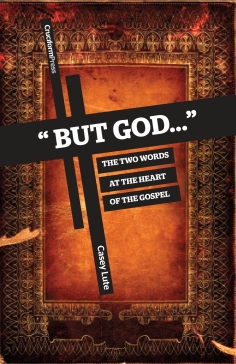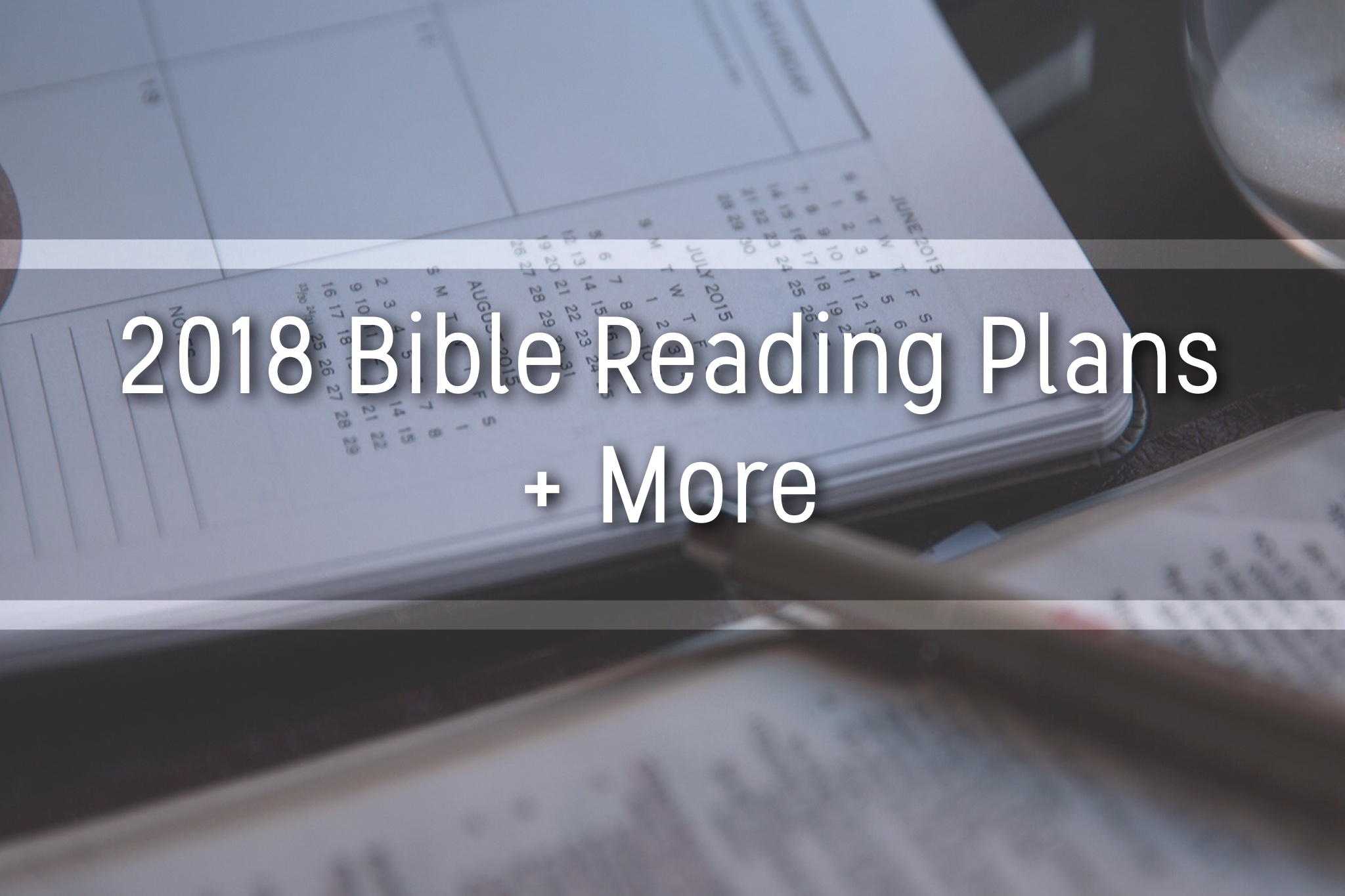I am in love with a little publisher called Cruciform Press. This publisher is a recent company on the scene of Christian books, but has quickly built up a library of material that is well worth our time. Their entire purpose is to publish God-glorifying books with solid theology yet at a very short length. Of the books I’ve seen, they’re often around 100 pages or less.
books, but has quickly built up a library of material that is well worth our time. Their entire purpose is to publish God-glorifying books with solid theology yet at a very short length. Of the books I’ve seen, they’re often around 100 pages or less.
One book that I’ve had my eye on for awhile is called “But God…”: The Two Words at the Heart of the Gospel by Casey Lute. This book certainly did not disappoint, and I highly recommend it to anyone interested in the subject matter (you can find it here).
What follows now is not such much a review nor a synopsis of the text, but just a small sampling of what the book contains. My hope is that you will learn something from this short post, that you would be motivated to pick up a copy of the book, and that this interaction might help me remember some things myself! Much of – if not all – of what follows I owe to Casey and this book.
—–
Many people are familiar with the text from Romans 5:8, which reads: “…but God shows his love for us in that while we were still sinners, Christ died for us.” I’d imagine this passage is what sparked Casey’s desire to write a book called “But God…” In the passages leading up to this verse, the Apostle Paul is making the observation that for an unrighteous person no one would dare die, yet perhaps for a righteous person (as Mr. Lute observes, this might be better read the righteous one) one might die for them. Yet, in Romans 5:8 Paul tells us “BUT GOD,” God acts on our behalf and always does. He is always the initiator.
The purpose then of this little book is to observe many places in Scripture which follow the “But God” pattern. There are 9 detailed examples in all (one of them being Romans 5:8) – I am going to highlight two of them below.
God Preserves Humanity (Chapter 1)
The first example Casey gives is of the story of Noah and the flood. Mr. Lute compares this story to climbing a trail on a mountain; it ascends to the main point, and then descends again (pg. 11). Even though the whole story is important, there is one single climaxing point.
Mr. Lute points to Genesis 8:1 as the climax of the account of Noah. It reads: But God remembered Noah and all the beasts and all the livestock that were with him in the ark. And God made a wind blow over the earth, and the waters subsided. Casey points out that this is the point of the story; Mankind deserves destruction, BUT GOD remembers Noah and chooses to save him and all of humanity (pg. 12).
What I love about this example given by the author is that he provides solid exegetical evidence for the claim that Romans 8:1 is the center point for the account of Noah. This evidence is based on the use of a chiasm. In literary story telling, particularly in the ancient world, chiasms were used to help the orator remember their place in the story as well as point to a climax of the story. A basic chiasm might look something like this:
A
..B
….C
……D
….C’
..B’
A’
In the case of the Noah account, Casey points out a chiasm as follows (pg. 13):
- And after seven days the waters of the flood came upon the earth (7:10) (A)
- The flood continued forty days on the earth (7:17a) (B)
- And the waters prevailed on the earth 150 days (7:24) (C)
- Our verse (8:1) (D)
- At the end of 150 days the waters had abated (8:3b) (C’)
- At the end of forty days Noah opened the window of the ark that he had made and sent forth a raven (8:6-7a) (B’)
- He waited another seven days, and again he sent forth the dove out of the ark (8:10) (A’)
Casey wraps up this example by highlighting that it was only by God’s grace Noah was saved. He was a sinner just like everyone else, but needed God to remember him to survive the judgement. God chose to remember Noah, just as he continues to remember his people today (pg. 16-17).
God Provides a Better Sacrifice (Chapter 4)
This Chapter revolves around Psalm 40:6-8, which reads: In sacrifice and offering you have not delighted, but you have given me an open ear. Burnt offering and sin offering you have not required.Then I said, “Behold, I have come; in the scroll of the book it is written of me:I delight to do your will, O my God; your law is within my heart. This is an interesting text, to which the author helps provide us clarification. Casey points out that having an open ear as this passage speaks of means “doing the will of God with delight, prompted by having God’s Word written on the heart. When one’s ears have truly opened to what God has to say, he joyfully obeys from the heart” (pg. 46).
However, this passage cannot truly be understood without the later book of Hebrews. In Hebrews Chapter 10 (specifically verses 1 and 4-7), the author of Hebrews specifically uses Psalm 40:6-8 as the voice of Christ, not David. Through this lens, we notice a few things thanks to Mr. Lute’s observations:
- God did not delight in the old covenant sacrifices and offerings because those sacrifices could not take away sins (pg. 47).
- Second, the author of Psalm 40:6-8 is identified as Jesus, which tells us that Jesus recognizes that the Father does not delight in sacrifices. God thus prepares a body for Christ so that Jesus – the “only sustainable alternative” – can perfectly fulfill God’s will as the once-for-all sacrifice for sins (pg. 47).
- The sacrificial system was meant to prepare the way for Jesus – it became obsolete when the incarnated Christ came (pg. 48).
- In a way, Psalm 40:6-8 is actually a record of a conversation between Jesus and God the Father before he came, explaining why he would come. This record is for our benefit (pg. 50).
- God desires a pure heart and “open ear.” These were both perfectly realized in Jesus, and in his obedience he became our perfect sacrifice (pg. 50).
—–
My brief interaction with this text cannot do justice to the awesome soul nuggets you’ll find in this book. I highly recommend you pick it up if you’re looking for a digestible and insightful book.
Christianity means community through Jesus Christ and in Jesus Christ. No Christian community is more or less than this…We belong to one another only through and in Jesus Christ. – Dietrich Bonhoeffer, Life Together, 1938
—–
The great Prince of Preachers Charles Spurgeon once said, “It seems odd, that certain men who talk so much of what the Holy Spirit reveals to themselves, should think so little of what he has revealed to others.” At the time Spurgeon was addressing a new attitude cropping up in the seminaries, where students thought themselves able to avoid the study of saints in Church history simply because they (the students) had the illumination of the Holy Spirit.
I’d like to open up Spurgeon’s line of thought and apply it to the church today: It seems odd that the church of the 21st century thinks so highly of what the Holy Spirit has taught us that she (the church) thinks so little of what the Holy Spirit had to say to the church throughout history*. Spurgeon’s thoughts here remind us of a very important truth: the Holy Spirit is not an individual gift. The Holy Spirit is a gift to the body of Christ, and he has taught others throughout history and continues to teach us today**.
Unfortunately for many Evangelicals the personal aspect of the Holy Spirit today is continually given more and more emphasis. This over-emphasis is now landing entire churches and denominations in terrible error. For many, their understanding of God’s Spirit is that since he leads us into all truth, they don’t need the church. For others still, they believe that they can easily refute historic church doctrines simply because “the Spirit told me so.” Their personal understanding of the Holy Spirit conveniently allows them to use all sorts of excuses like “that isn’t what this text means to me” or “I have the Spirit so I don’t need to go to church.” When the personal experience of the Holy Spirit is emphasized above the experience of being brought into the body of Christ, that person will always talk about “I” and “me” but never about “we.”
We would do well to catch ourselves in this error while we have a chance before it runs even more rampant than it already has. The result of this personal emphasis of the Holy Spirit is not only unbiblical practices, but an identity build on rugged individualism and proud separatism. This identity can never lead to Christian love.
The working of the Holy Spirit is not primarily a personal category, it is first-of-all a Body-of-Christ category. The gift of the Holy Spirit isn’t about you. The Holy Spirit is Christ’s gift to the church. Scripture tells us that God’s Spirit belongs to him and is a gift to his people:
And because you are sons, God has sent the Spirit of his Son into our hearts, crying, “Abba! Father!” – Galatians 4:6
And we all, with unveiled face, beholding the glory of the Lord, are being transformed into the same image from one degree of glory to another. For this comes from the Lord who is the Spirit. – 2 Corinthians 3:18
The Spirit himself bears witness with our spirit that we are children of God, and if children, then heirs—heirs of God and fellow heirs with Christ, provided we suffer with him in order that we may also be glorified with him. – Romans 8:16-17
The church corporate is being conformed to the image of Christ. Ephesians 1:18 tells us that the saints (read: the church) are Christ’s inheritance. There is one body and one Spirit; we can no longer think of ourselves as individuals (Ephesians 4:4). One way the Bible speaks to this is by means of our adoption. The Westminster Longer Catechism describes our adoption this way:
Adoption is an act of the free grace of God, in and for his only Son Jesus Christ, whereby all those that are justified are received into the number of his children, have his name put upon them, the Spirit of his Son given to them, are under his fatherly care and dispensations, admitted to all the liberties and privileges of the sons of God, made heirs of all the promises, and fellow-heirs with Christ in glory.
While we were formerly individuals and lost in our sin, we do not remain that way when we are brought into the family of God:
For just as the body is one and has many members, and all the members of the body, though many, are one body, so it is with Christ. For in one Spirit we were all baptized into one body—Jews or Greeks, slaves or free—and all were made to drink of one Spirit. – 1 Corinthians 12:12–13.
The role of the Holy Spirit is to point us to Christ, and when we are guided to Christ our concern should always become about the church body and not us as individuals. Within the body of Christ, we are intended to love one another. Love is the reflection of what we have received from God through Jesus Christ; this love is the vital reflection and unity of the church. This is why Paul routinely speaks out against individualism in his epistles. Love is not individualistic or proudly separate, but always concerned above all-else with the body and not the individual. This love is inspired by the example and self-surrender of Christ and therefore it is specifically and distinctly Christian.
—–
* Thanks to Dr. Nichols from Ligonier’s “5 Minutes in Church History” for this elaboration.
** Let me first say that I am grateful that we even have a personal understanding of the Holy Spirit. It is certainly important for us to understand that the Holy Spirit does work in the individual and brings individual sinners towards understanding, faith and repentance. The Holy Spirit does train us in righteousness through the Word of God. He does give us the power to resist sin and the devil, as well as the strength and heart to pursue Christ. I am not, and would never deny any of those things (as well as others like equipping the church by the distribution of gifts, etc.).
It’s a little rough, but here’s my attempt at an Advent poem. They say you only get better with practice, right?
—–
He had finally arrived! The time had come!
Gather the shepherds, their sheep; who knows where from?
They saw a baby, in swaddling clothes he was placed.
What God saw was his loving extension of grace.
Bethlehem; “The House of Bread.”
Only on Him can we be fed.
A humble King born in a trough;
It was on his beaten back that God’s wrath was wrought.
A son born; Jesus his name.
He had come to give his Father glory and fame.
His advent foretold through clear prophecy,
“Cursed are those who hang on a tree.”
His soft newborn skin with that beautiful baby glow;
A lowly stable the place where God’s mercy was shown.
Then one day with blood trickling down his side,
He took the death that should’ve been mine.
Mary caressed him while all others were asleep,
Kissing the cute wrinkles in his feet.
In those same feet a nail would be driven;
But unto us a Savior was given.
Counting others more significant, in humility he came;
A servant to all in the form of a babe.
Though in the form of God, equality would not be grasped.
Emmanuel, “God with us,” had come at last.
The angels came, in the fields they sang;
A heavenly chorus and trumpets rang.
Dying for sinners, he stood in our place.
Now we can see him with unveiled face.
This gentle baby, the wise men did admire;
Of giving praise and worship they did not tire.
But then it came when he was hoisted up for all to see;
All laughed and mocked at this Jew from Galilee.
Some thirty years he spent living with us;
A King coming off his throne to crawl in the dust.
The empathetic High Priest, with him we can relate.
Drawing near with confidence, and someday entering Heaven’s gate.
Lo and behold, there is news of great joy!
It is only found in this newborn boy.
They saw a baby, in swaddling clothes he was placed.
What God saw was his loving extension of grace.

Photo Credit: Tambako the Jaguar via Compfight cc
This post is an excerpt from a hilarious book that I love and would highly recommend, called Younger, Restlesser, Reformeder: A Good-Natured Roast. If you want an easy and fun read about the new Reformed movement, pick this up here.
—–
Who Gets to be Called Reformed?
Before we get to specifics, there is the not-small question of who gets to be called reformed. This is a tough one. If you don’t sprinkle babies, are you really reformed? And without the “Reformed,” you’re just the Young & Restless, which sounds exceedingly worldly. Hmmm.
John Piper and Collin Hansen are both Baptists, just saying. For what it’s worth, Zach pastors a Baptist church and Ted (the authors) goes to a Reformed church – but neither of us sprinkle babies. However, Zach is Dutch, which gives him added cache. Ted, on the other hand, is German (his ancestral name is Von Kluck, not Van Kluck or even Vander Klucksma)…aaargh! This is all so complicated. And while we’re being honest, we both still read the NIV from time to time.
An easy out is to continually make the distinction between reformed and Reformed, but do you really want to walk around, saying, “I’m lowercase-r reformed?” Neither do we (so we’ll just stick with the lowercase to keep things simple).
At the end of the day, we needed a concrete formula. We needed certainty. We’re not postmodern, after all. So just grab a pencil and paper, and work through this simple equation:
CW + Ch(Rf) + RCL + CCC + @ – 10(TV) – 20(RW) – ($TBN/10) – (xWB) – 10Em = RQ
The Equation Explained
Number of Crossway books in your collection; plus number of children; times number of children named after reformed personalities; plus number of reformed conference badges/lanyards (T4G, Desiring God, Next, Gospel Coalition); plus Number of Confessions, Catechisms, and Creeds you subscribe to; plus number of hours weekly spent on challies.com, Deyoung’s blog, or any other Gospel Coalition blog; minus 10 if you have cable; minus 20 if you un-ironically have a Rick Warren or Joel Osteen book on your shelf; minus number of dollars pledged to TBN (divided by 10); minus number of times you’ve been watchblogged; minus number of years spent in your emergent phase (times 10); equals your reformed quotient.
Ben’s Note: This is a pretty harsh standard, so if you need to curve your number, add in the beard modifier (your appreciation for beards on a scale of 1-100, divided by 2).
Go ahead and figure out your number. Remember, God is watching…alllllways watching.
Once you have your number, here are the ranges where you might fall:
<0 If you’re elect, that’s news to God
1-5 You’re reading this book to trash it in your emergent blog.
6-20 Enjoy the climbing wall and gourmet coffee bar at your megachurch. You’re fooling no one.
21-50 There’s potential here, but we suggest that you stop coaching your kids’ Little League team, stop surfing ESPN.com, and start spending all of your free time (when you’re not spending time with your Proverbs 31 wife), trolling the YRR blogosphere. We also suggest spending a little bit more of your debt-free expendable income at the Monergism bookstore. Oh, and it’s time to at the “L” to your TULIP. You know who you are.
51-100 What do you think of someone who just does the bare minimum? Seriously, what do you think? Minus ten more points if you get that reference.
100-200 You’ve probably spoken or led a breakout session at a regional reformed conference. Congratulations! Things are looking up for you. Have you considered submitting a book proposal? We know you’ve got 50,000 words stashed away somewhere that you’ve never told anyone about. Maybe you can recycle some old blog posts.





